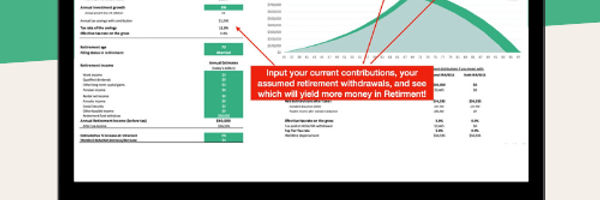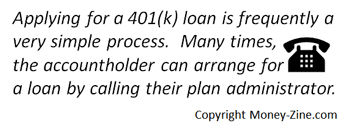For many individuals, their 401(k) plans are the first and only place reserved for consistent and "real" savings. This is money put away, and never touched until retirement. But what happens if someone is faced with an unexpected expense? Is getting a 401(k) loan possible?

Roth IRA or 401k? This template will answer your questions.
With this template, you will get:
All DFY, simply add your details
Charts for comparison and clear answer
Easily update for any year (2023, 2024, 2025, etc…)

Obtaining a 401(k) Loan
Before answering the question "Can I get a loan from my 401(k)?" It's important to address the question: "Should I withdraw money from my plan?" Most financial planners would answer this second question with a simple "No."
Additional Resources |
That's because taking out a 401(k) loan is like borrowing against a financially-secure retirement. They'd argue that money in the account serves only one purpose: it's a source of retirement income. But most decisions people are faced with in life are not so black and white. There are ways to borrow money from a 401(k) plan, and that discussion will start shortly. But it's important to emphasize how financial planners feel about loans, with one slight modification. If someone is going to borrow money from an account, it should be for a very good reason; almost as a last resort.
Loan Rules
Over the course of this article, the focus will be on true 401(k) loans. It's always possible to take money out of a 401(k) plan, but the federal income tax penalties will make that withdrawal very costly. Fortunately, the Internal Revenue Service does allow taxpayers to borrow money from their plan, in the form of a loan, and without any taxation penalties.
Acceptable 401(k) Loans
In addition to the IRS, accountholders may also need to speak with their plan administrators to determine the exact terms and conditions of a loan, including if it is allowed under their plan. Generally, the following are considered acceptable reasons for taking out a loan:
College Tuition: to pay for higher education / college tuition expenses for the accountholder, their spouse, or their children.
Home Mortgage: to prevent eviction from a home due to unpaid mortgage bills or possibly bankruptcy.
Medical Expense: to pay any un-reimbursed medical expenses. This type of loan would be considered a hardship loan.
First Time Home Buyer: to put a down payment on a new home or residence when the individual is a first-time home buyer.
Individuals planning to take out a loan to pay their monthly credit card bills should look elsewhere. In fact, they might be better off just taking a hard look at their household budget. It's never a good idea to borrow from a retirement fund to pay for today's expenses.
Typical Loan Rules
As mentioned earlier, while the federal government might allow an individual to borrow money from their 401(k) plan, the plan administrator will have repayment rules that employees need to be aware of before taking out a loan. Typical rules might include:
Length of Loan: generally, the loan term would be five years (60 months) or less. In the case of a home loan, terms could be as long as 15 years.
Loan Minimum: loan thresholds are usually $1,000. Loans of lesser amounts shouldn't even be considered from a 401(k) account.
Loan Maximums: usually the smallest of 50% of the account balance or $50,000.
Loan Fees: plans can charge fees for loans, including loan initiation fees and annual service charges.
Repayment: this typically occurs evenly over 60 months, although as mentioned, loans beyond 60 months are possible. Repayment is usually accomplished through direct payroll deduction.

Like most loans, there are some pros and cons that apply when borrowing from an account.
Advantages
Applying for a 401(k) loan is frequently a very simple process. Many times, the accountholder can arrange for a loan by calling their plan administrator.
Any interest paid on the loan goes back into the account. That is to say, the accountholder keeps the interest they're required to pay on the loan.
Interest rates are usually very competitive, even if the individual has a poor credit rating.
Disadvantages
Perhaps the biggest drawback of a 401(k) loan is the fact some plans do not allow individuals to contribute to their account until the loan is completely repaid. If an employer matches employee 401(k) contributions, this "free" money is lost until the loan is repaid.
The interest rate or expense paid on a 401(k) loan is not tax deductible.
The term of these loans, five years / 60 months, is relatively short when compared to options such as personal loans.
On that last point, it's worth mentioning some of the alternatives to this type of loan.
Alternatives
Individuals taking out a 401(k) loan to pay for college tuition or medical expenses, have some very good alternatives including:
Home Equity Loans / Lines of Credit: one of the big benefits of a home equity loan is that the interest portion of the payment is usually tax deductible. Plus, the length of the loan, or payment term, can be much longer (greater than 60 months) with a home equity loan when compared to a 401(k) loan.
Federal Student Loans: if the accountholder is a student, or the parent of a college student, then a better alternative might be one of the many student loan programs offered by the federal government. The payment terms and interest rates on a student loan are very low when compared to other types of loans.
Finally, anyone considering a loan can use one of the many 401(k) and retirement calculators found on this website to determine if their plan is financially healthy. There are also many loan calculators on this website that can be used to determine monthly payments on a loan too.
About the Author - 401(k) Loans



.jpg)
.jpg)